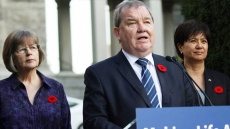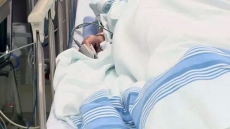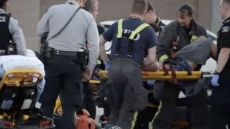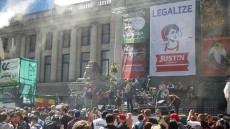CALGARY — A $15 box of tampons sold at the Calgary International Airport may have elicited shock online, but it's common for feminine hygiene products to cost that much — or more — in many remote northern communities.
Carlee Field was waiting for a flight from Calgary to Vancouver last month when she stopped to use the ladies' room in the terminal and saw a box of tampons with an unsigned handwritten note.
"None of the tampon vending machines work in this area so I was forced to buy this $15 box from Relay. Not acceptable!" the note said. "Please take one if you need one."
Shortly after Field posted a photo on the social media site Reddit, the airport authority wrote that the machines had been refilled and the price at Relay had been lowered to $6.25.
Field is glad her post has opened a conversation about how period products are too often viewed as a luxury rather than a necessity.
"I don't go month to month and go, 'Man, I really want a box of tampons.' No, I really need one," Field said.
"It would be cool if they were just free for everybody. They give toilet paper away for free. Why can't they give pads and tampons away for free?"
Keetha Mercer, program manager of community initiatives at the Canadian Women's Foundation, said she's not surprised Field's post went viral since it speaks to another cost women have to factor into their daily lives — a particular burden for 1.5 million women in Canada who live on a low income.
"Women are paid less and our products often cost more," she said. "Women shouldn't have to choose between putting food on the table and buying products for their basic needs, but that's the reality for many women in Canada."
The regional disparities are striking, she said.
In Iqaluit, a 40-pack of tampons is $15 and in the First Nations community of Attiwapiskat, Ont., near the shore of James Bay, it's about $18.
Community organizer Nicole White began collecting donations of pads and tampons for schools, health centres and shelters after hearing that girls in northern Saskatchewan were missing school during their periods.
"That is something that's unacceptable to me," she said. "If you're a person who's living under the poverty line, feminine hygiene products are seen as a luxury."
White's group, Moon Time Sisters, donated 96,000 products to 15 Saskatchewan communities during its inaugural drive last spring. It has since branched out into Ontario.
Veronica Bairos, who runs the Ontario chapter, said women who can't afford pads or tampons resort to using rags or used clothes.
"It is a pretty big expense for a lot of women. And obviously income is very low usually in those areas. Employment rates are quite low in those areas."
Feminine hygiene products were subject to GST until 2015 — even though incontinence products, cocktail cherries, human sperm and wedding cakes were not, said the group Canadian Menstruators, which campaigned to end the tax.
The group estimates Canadians spent almost $520 million on sanitary products in 2014.
Even without the GST, the cost is still a burden for many.
Most women in Canada don't know what it's like to ration pads and tampons so that they can make it through the day, said Elsbeth Mehrer, vice-president of engagement and people at YWCA Calgary.
The YWCA receives donations of those products, but when they run out, the cost comes out of programming funding.
Mehrer said it's important that feminine hygiene products are readily available at shelters for women struggling with homelessness or fleeing domestic violence.
"It doesn't become yet another thing on their list to tick off as they're trying to go about their daily lives," she said. "It shouldn't be something that's hard."




